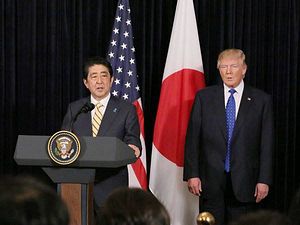Never before have we seen a U.S. president who regularly posts ill-thought-out and seemingly random policy ideas through social media. New measures implemented by the new administration under the banner of “Make America Great Again” already seem to have created controversies and wide schisms. Against this backdrop, how should a foreign leader deal with the new American leadership of Donald J. Trump?
What should such a leader like Japan’s Shinzo Abe, who previously enjoyed a positive working relationship with the Obama administration, now do? How should this new presidency, so radically different in both style and substance, be approached? The previous administration was largely a known quantity, in that given clear inputs, policy output was generally predictable. The current administration, however, acting outside of established norms, appears difficult to second-guess. And Trump certainly embodies a much more volatile persona than his predecessors.
Given the choice, leaders obviously prefer to deal with counterparts with whom they can engage on a personal level and whose views closely match their own. But in practice, the world rarely presents such easy partnerships.
Building a normal relationship with the Trump administration runs the risk of seeming to lend support to these controversial and divisive measures. Indeed, criticisms of Abe — and British Prime Minister Theresa May before him — for visiting the U.S. and forging working relationships with the Trump administration appear rooted in the belief that such efforts should be interpreted as unqualified support for President Trump. But this critique is unfair. May and Abe are, in fact, practicing realpolitik, putting their respective national interests first.
Those who advocate disengagement from America, at least until the current administration runs its course, have to make a plausible case that this will likely lead to a better outcome than selective and constructive engagement. Such an argument is difficult to make.
In Japan’s case, consider Trump’s articulated positions before and after his election. Candidate Trump suggested Japan might have to become a nuclear weapons state, advocated trade tariffs and protectionism, and accused Japan of currency manipulation. America’s support for Japan, under Candidate Trump, looked uncertain. Consequently, Abe’s visit to Trump Tower, immediately after the president’s election victory and ahead of other world leaders, was a rational and necessary response. Abe needed to meet, greet, and formulate a plan in terms of how to work with America’s new management. The United States is, after all, Japan’s only ally. Japan has little choice but to engage with the administration with which it is presented.
Going into the third week of the Trump presidency, Abe returned to America for the first summit talks. On this occasion, Trump affirmed that Article V of the U.S.-Japan Treaty of Mutual Cooperation and Security covers the Senkaku (Diaoyu) Islands, a major achievement for Japan. He also expressed gratitude for Japan’s hosting of American military assets and confirmed U.S. opposition to North Korea’s intercontinental ballistic missile (ICBM) and nuclear weapon programs. Furthermore, the president now appears mute over the currency and trade issues that previously caused such great unease. On the assumption that Trump’s policies do not flip-flop, as they are sometimes wont to do, the visit certainly achieved some degree of diplomatic success.
Japan enjoyed a positive relationship with America during the Obama years, and did not want to see this progress regress. In 2015, for example, revisions to the Guidelines for U.S.-Japan Defense were agreed upon for the first time in 18 years and Abe became the first Japanese prime minister to address a joint session of the U.S. Congress. And Obama and Abe worked together to heal past wounds, with Obama visiting Hiroshima and Abe traveling to Pearl Harbor.
The Abe administration, however, did not predict Trump’s victory, and Abe did not meet with Trump during the campaign. But with Trump’s unexpected victory and the U.S. abandonment of the Trans-Pacific Partnership (TPP), which Japan supported and ratified, it is only natural that Abe felt the need to quickly fill the gap, reassert his country’s positions, and ensure no further retrenchment. With or without the TPP, America and Japan still share many challenges, mutual concerns, and common interests.
Recognizing Abe’s pragmatism essentially frames the diplomatic endeavor as a state-to-state, rather than an administration-to-administration construct. Japan’s relations with the United States will, ultimately, long outlast the Trump presidency.
The question remains as to whether Trump will deviate from what was announced this past week. Policy positions under the new administration remain unpredictable. Abe may have played his cards as well as he could have, but what will happen when other nations similarly engage with the Trump administration? As the U.S. shifts from “pivot to Asia” to “America first,” Japan’s work has surely only just began.
Yukari Easton is an ACE-Nikaido Fellow at the East Asian Studies Center at University of Southern California whose research focus is upon international relations, diplomacy and security issues in the Asia-Pacific region. Previously, she worked for ten years in international banking in Europe and Asia.

































